One autumn afternoon just prior to the Chinese Moon Festival (
This scene has been repeated yearly ever since the THSRC won the biggest build-operate-transfer project bid in the world against the Chunghwa High-Speed Rail Consortium, led by Liu Tai-ying (劉泰英) in 1999. The investment capital involved in building the high-speed rail from Taipei to Kaohsiung along Taiwan's west coast is estimated at more than NT$446.4 billion (US$12.7 billion) and is scheduled to be completed in October 2005.
The bidding on the high-speed railway project in 1999 made bird-watching communities increasingly nervous. Since the government decided in 1990 to set up an ad-hoc Bureau of High Speed Rail, business conglomerates in Taiwan and abroad have congealed into two competing consortiums. News reports and politicians all over the country engaged in propagandizing about how great a boon the project would be both to the growth of Taiwan's economy and the general public's travel convenience. Hardly anyone was paying attention to the project's potentially disastrous impact on the natural environment of the west coastal regions of Taiwan.
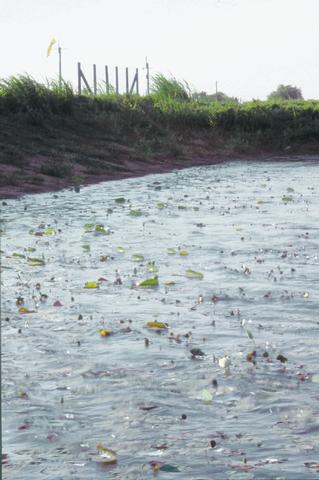
Ing, one of the most distinguished female entrepreneurs in Taiwan and perhaps in the whole of Asia, enjoys visiting the site and meeting these handful of men every year for some good reasons.
For one, the high-speed rail will traverse a huge piece of farmland, an area which happens to be the highly critical natural habitat of Taiwan's pheasant-tailed jacana (
Perhaps the most important reason is that the high-speed rail project cannot afford delays nor confrontation from the local conservation groups. The project is too obvious of a target for environmental protection groups to easily mobilize their forces. Once the fire of ecological concern is spread, the consortium, which includes international banks and business groups, may be intimidated and back off from the project.
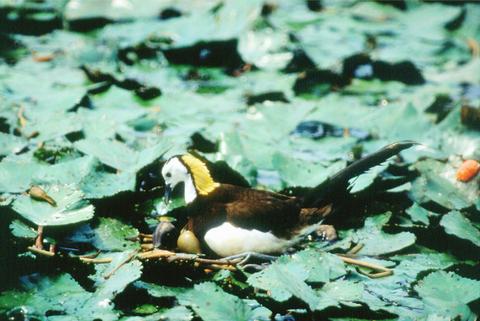
PHOTO COURTESY OF LEE WEN-HWA
The Bayer Group's NT$50 billion chemical plant project in Taichung County would serve as a reminder to any big company from abroad. Bayer decided at the last moment to pull its investment plan from Taiwan in 1997 due to unfavorable news coverage and persistent and fierce protests from environment groups all over Taiwan.
Since the early 1990s, local conservation groups have been urging the government and the public to undertake a joint effort to revive Taiwan's decreasing jacana population. In an ironic and embarrassing twist, the same year that the jacana was named Tainan's county bird, their number shrank to around 40 and they were facing immediate extinction, according to a field study report published in 1998.
However, the local conservationists were smart enough this time to keep a low profile on this thorny issue and tried patiently to reason with government officials. Philip Kuo (
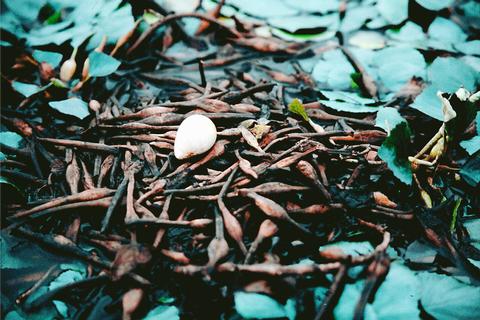
PHOTO COURTESY OF TENG PO-LING
Draft conservation guidelines concerning the jacana were signed by all sides. A critical statement indicated that, unless another proper location could be found to replace the then major natural habitat for jacana birds, the environmental impact assessment conducted by the Council for Agricultural Planning should not be approved. The agreement was laid out to the bidders beforehand and was accepted without challenge by Ing's group in a move that surprised everybody.
After the THSRC won the bid, the parties held many friendly discussions. A crucial agreement was then reached in late 1999 to the effect that the local conservation groups could rent a 15-hectare piece of farmland. The land was located approximately 2km to the south as an initial land swap for a section deemed critical to the jacana's natural habitat and targeted for construction of the high-speed rail.
To pay for the land use -- or to put it more precisely, non-use -- yearly land rental was estimated at NT$2 million and was evenly divided among the Bureau of High Speed Rail and the THSRC. In addition, the THSRC agreed to provide another NT$2 million per year to cover the operational expenses of this new conservation site. The Tainan County government would put up some materials, such as fertilizers or small plants, worth about NT$1 million each year to back up the project. In return, the construction work on the high-speed rail would be launched without delay.
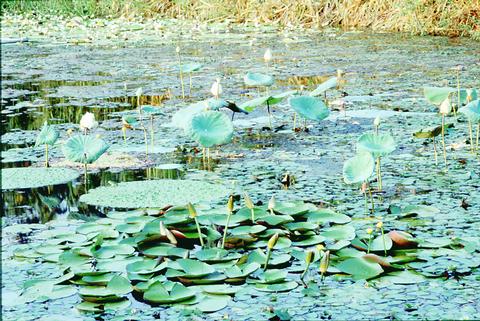
PHOTO COURTESY OF TENG PO-LING
Lee Chien-an (
So, in fact, those handful of people hanging out with Ing in Kuantien were leading staff members and volunteer workers from bird-watching societies in Chiayi, Tainan, Kaohsiung and Pintung.
They are daily scrutinizing the activities and natural habitat of the jacana birds in this area of now fallow land reserved for wild birds to feed, find shelter, breed and protect themselves from attack by wild cats and dogs or human disturbances.
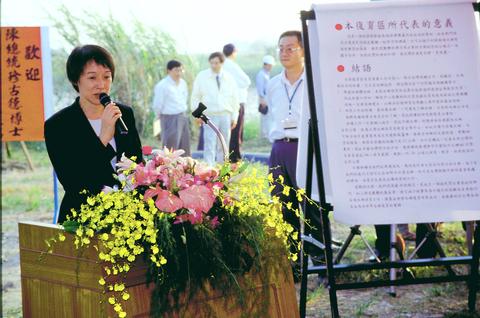
PHOTO COURTESY OF TENG PO-LING
According to the chair of the Pheasant-tailed Jacana Restoration Committee, Chiu Man-hsin (
"I bet that if I looked after the gardens and ponds really well and created a natural environment similar to that the jacana had in its old natural habitat, the bird would be lured to this new friendly environment for good," Chiu said. So he relegated all the work at his construction company to his family in Kaohsiung and now works full time without pay in this bird paradise in Tainan County. From the year 2000 to March of this year, a total of 1,000 volunteers have worked to establish this man-made conservation site. They go there to help out on building or repairing bamboo fences, planting new trees, spreading fertilizer and so on. Chiu's hard work and devotion paid off quickly.
All work restoring the number of pheasant-tailed jacana in Tainan started in 2000. During the first year, four jacana birds bred at the new site. Last year, 46 new birds hatched and continue to grow to maturity. Through March of this year, the total number of jacana has surged to 150 and another 75 or more new birds are expected by the end of this year. Chiu optimistically expressed his hope that the total number of jacana in Tainan can be increased and maintained to a safer level of over 200 in the year to come.
Meanwhile, Chiu is planning to incorporate another 15-hectare farmland adjacent to the present conservation site. His plans include setting up a multi-story visitor's center and various ecology classrooms for students. He said that his new bird garden could now offer up to 100 or more bird species for bird-watchers to observe during most of the year. Once the conservation site is doubled, its variety of birds, water plants and flowers will outrank those in Kuantu Natural Park (
The story of severe conflict or clash between the conservationists and land developers has seemed never-ending either in Taiwan or other parts of the world. This largely repetitive process of protest and coming to blows among interest groups has become such a cliche that many people do not bother to care about it any more. Yet, this experience can serve as an ingenuous precedent, one which deserves to have people in Taiwan think about conflict resolution from a different perspective.
With a little more sense of responsibility to society and deeper mutual respect for the living creatures around us, a potentially explosive social and environmental issue can be turned into an ecological miracle, settled peacefully and to the satisfaction of all involved.
The construction of the high-speed railway has been the largest capital investment ever by the private sector in Taiwan. It is therefore understandable that Ing and her group are at great risk and under enormous working pressure. Nonetheless, Ing is willing to take time off to pay a personal visit to the concerned conservationists. Having done so, she has won their hearts and friendship, making every future negotiation easier and smoother. As Chiu later confessed: "I am really impressed and touched by Ms Ing's genuine concern about the feelings of others. Everybody seems to feel she is one of us, not the big boss on the other side of the negotiation table."

This is the year that the demographic crisis will begin to impact people’s lives. This will create pressures on treatment and hiring of foreigners. Regardless of whatever technological breakthroughs happen, the real value will come from digesting and productively applying existing technologies in new and creative ways. INTRODUCING BASIC SERVICES BREAKDOWNS At some point soon, we will begin to witness a breakdown in basic services. Initially, it will be limited and sporadic, but the frequency and newsworthiness of the incidents will only continue to accelerate dramatically in the coming years. Here in central Taiwan, many basic services are severely understaffed, and

It is a soulful folk song, filled with feeling and history: A love-stricken young man tells God about his hopes and dreams of happiness. Generations of Uighurs, the Turkic ethnic minority in China’s Xinjiang region, have played it at parties and weddings. But today, if they download it, play it or share it online, they risk ending up in prison. Besh pede, a popular Uighur folk ballad, is among dozens of Uighur-language songs that have been deemed “problematic” by Xinjiang authorities, according to a recording of a meeting held by police and other local officials in the historic city of Kashgar in

Jan. 5 to Jan. 11 Of the more than 3,000km of sugar railway that once criss-crossed central and southern Taiwan, just 16.1km remain in operation today. By the time Dafydd Fell began photographing the network in earnest in 1994, it was already well past its heyday. The system had been significantly cut back, leaving behind abandoned stations, rusting rolling stock and crumbling facilities. This reduction continued during the five years of his documentation, adding urgency to his task. As passenger services had already ceased by then, Fell had to wait for the sugarcane harvest season each year, which typically ran from

The People’s Republic of China (PRC) was out in force in the Taiwan Strait this week, threatening Taiwan with live-fire exercises, aircraft incursions and tedious claims to ownership. The reaction to the PRC’s blockade and decapitation strike exercises offer numerous lessons, if only we are willing to be taught. Reading the commentary on PRC behavior is like reading Bible interpretation across a range of Christian denominations: the text is recast to mean what the interpreter wants it to mean. Many PRC believers contended that the drills, obviously scheduled in advance, were aimed at the recent arms offer to Taiwan by the